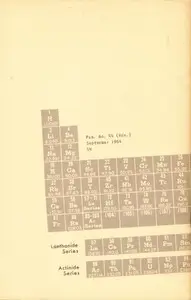"A Brief History of Element Discovery, Synthesis, and Analysis" by Glen W. Watson is a scientific publication written in the early 1960s. The book provides an overview of the historical evolution of chemical elements, detailing the advancements in the methods of discovering, synthesizing, and analyzing these substances. It discusses the transition from ancient concepts of elements to modern discoveries and theories in chemistry and nuclear physics. In this work, Watson chronicles the journey of element discovery, starting with ancient theories proposed by Greek philosophers and leading to groundbreaking achievements in modern chemistry, particularly at the University of California's Radiation Laboratory. He highlights key figures such as Robert Boyle, Marie Curie, and Ernest Rutherford, illustrating how their contributions laid the groundwork for understanding elements and radioactivity. The book emphasizes the technological innovations that enabled the synthesis of new elements—such as cyclotrons—and the significance of isotopes and nuclear reactions in expanding the periodic table, particularly during the mid-20th century. Overall, Watson's narrative not only enriches our understanding of chemical science but also presents a fascinating timeline of human inquiry into the building blocks of matter. (This is an automatically generated summary.)

A Brief History of Element Discovery, Synthesis, and Analysis
By Glen W. Watson
"A Brief History of Element Discovery, Synthesis, and Analysis" by Glen W. Watson is a scientific publication written in the early 1960s. The book pro...
Genres
Released
2010-03-13
Formats
epub
mobi
epub3 (images)
mobi (images)
epub (images)
Free Download
Overview
About the Author
Information on this author is scarce, but their work continues to inspire readers.
Total Reviews
10.0k
Total reviews from Goodreads may change













